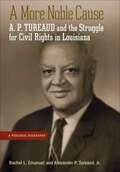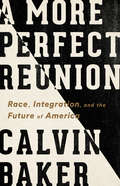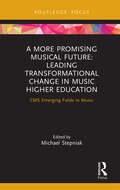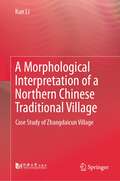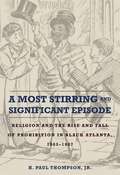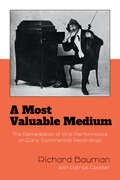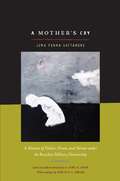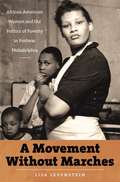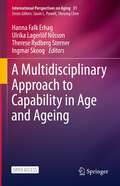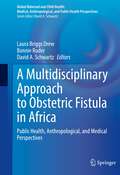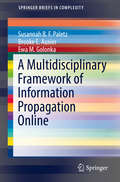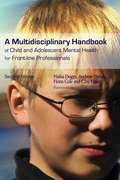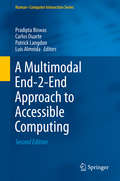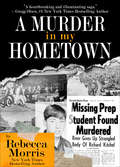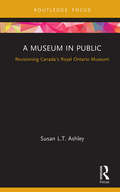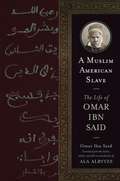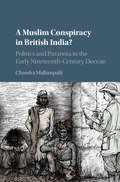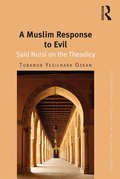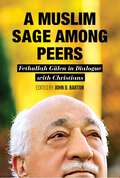- Table View
- List View
A More Noble Cause: A. P. Tureaud and the Struggle for Civil Rights in Louisiana
by Rachel L. Emanuel Alexander P. Tureaud Jr.Throughout the decades-long legal battle to end segregation, discrimination, and disfranchisement, attorney Alexander Pierre Tureaud was one of the most influential figures in Louisiana's courts. A More Noble Cause presents both the powerful story of one man's lifelong battle for racial justice and the very personal biography of a black professional and his family in the Jim Crow-era Louisiana.During a career that spanned more than forty years, A. P. Tureaud was at times the only regularly practicing black attorney in Louisiana. From his base in New Orleans, the civil rights pioneer fought successfully to obtain equal pay for Louisiana's black teachers, to desegregate public accommodations, schools, and buses, and for voting rights of qualified black residents.Tureaud's work, along with that of dozens of other African American lawyers, formed part of a larger legal battle that eventually overturned Plessy v. Ferguson, the 1896 U.S. Supreme Court decision that legalized racial segregation. This intimate account, based on more than twenty years of research into the attorney's astounding legal and civil rights career as well as his community work, offers the first full-length study of Tureaud. An active organizer of civic and voting leagues, a leader in the NAACP, a national advocate of the Knights of Peter Claver—a fraternal order of black Catholics—and a respected political power broker and social force as a Democrat and member of the Autocrat Club and Alpha Phi Alpha fraternity, Tureaud worked tirelessly within the state and for all those without equal rights.Both an engrossing story of a key legal, political, and community figure during Jim Crow-era Louisiana and a revealing look at his personal life during a tumultuous time in American history, A More Noble Cause provides insight into Tureaud's public struggles and personal triumphs, offering readers a candid account of a remarkable champion of racial equality.
A More Perfect Reunion: Race, Integration, and the Future of America
by Calvin BakerA provocative case for integration as the single most radical, discomfiting idea in America, yet the only enduring solution to the racism that threatens our democracy.Americans have prided ourselves on how far we've come from slavery, lynching, and legal segregation-measuring ourselves by incremental progress instead of by how far we have to go. But fifty years after the last meaningful effort toward civil rights, the US remains overwhelmingly segregated and unjust. Our current solutions -- diversity, representation, and desegregation -- are not enough.As acclaimed writer Calvin Baker argues in this bracing, necessary book, we first need to envision a society no longer defined by the structures of race in order to create one. The only meaningful remedy is integration: the full self-determination and participation of all African-Americans, and all other oppressed groups, in every facet of national life. This is the deepest threat to the racial order and the real goal of civil rights.At once a profound, masterful reading of US history from the colonial era forward and a trenchant critique of the obstacles in our current political and cultural moment, A More Perfect Reunion is also a call to action. As Baker reminds us, we live in a revolutionary democracy. We are one of the best-positioned generations in history to finish that revolution.
A More Perfect Union: Why Straight America Must Stand Up for Gay Rights
by Richard D. MohrThis book illustrates how the most basic and widely-held values of American society demand justice for gays and lesbians, and why America must stand up for Gay Rights.
A More Promising Musical Future: CMS Emerging Fields in Music (CMS Emerging Fields in Music)
by Michael StepniakToday’s higher education music faculty and administrators are faced with extraordinary pressure to adapt, innovate, and change. But what change is most critical to pursue – and how can it be brought about effectively? This concise volume brings together four seasoned thought leaders with distinct voices, each providing a complementary glimpse into how music faculty and administrators can help lead changes that truly matter. Making the case for transformations to better align music training in higher education with our culturally diverse society and the actual marketplace facing graduates, the perspectives collected here provide essential change management leadership strategies for music departments in the 21st century. Covering topics such as diversity and inclusion, institutional transformation, and preparing students for contemporary music careers, each chapter includes an outline of specific steps that can be taken individually and collectively towards needed change. Illuminating issues and providing practical suggestions, this book will enable both music faculty and administrators to confidently navigate change together with their communities.
A Morphological Interpretation of a Northern Chinese Traditional Village: Case Study of Zhangdaicun Village
by Kun LiThis book challenges the definition of a new approach for integrating protection and enhancing the Chinese heritage category of “Traditional Villages”. By applying a specific case study in the Hancheng context, Shaanxi Province, which lacks sound studies, the book formulates new theoretical prerequisites for future re-searches, an in-depth knowledge path, and sound methodological principles. By working in a multiple scales approach, the object of preservation and enhancement is first of all redefined in its ontology as a unity formed by the courtyard type, the morphology of the village, and the related landscape structures. All these three levels of study have been deeply investigated, put into the relationship and resulting in a new methodology which overcomes the inadequacy and ineffectiveness of the notion of “setting” deriving from conservation Charters, to embrace the structural notion of “context” and a knowledge approach to rural settlements’ form. The innovative and original features of this book are both in the reading villages in their landscape dimension, which in turn is studied as a context made of several interrelated structures. Another original feature of the book is the integration of Italian historic-structural and morphological methodologies with specific Chinese cultural aspects. The author’s work dug deeply and interdisciplinary in all those dimensions to account for the complex issues that are related and embodied in both the physical and intangible meaning of human settlements, opening a novel scientific methodology for Chinese studies as a sound base to define three key integrated project actions: what, why, how to preserve, enhance, develop.
A Most Masculine State
by Madawi Al-RasheedWomen in Saudi Arabia are often described as either victims of patriarchal religion and society or successful survivors of discrimination imposed on them by others. Madawi Al-Rasheed's new book goes beyond these conventional tropes to probe the historical, political, and religious forces that have, across the years, delayed and thwarted their emancipation. The book demonstrates how, under the patronage of the state and its religious nationalism, women have become hostage to contradictory political projects that on the one hand demand female piety, and on the other hand encourage modernity. Drawing on state documents, media sources, and interviews with women from across Saudi society, the book examines the intersection between gender, religion, and politics to explain these contradictions and to show that, despite these restraints, vibrant debates on the question of women are opening up as the struggle for recognition and equality finally gets under way.
A Most Stirring and Significant Episode: Religion and the Rise and Fall of Prohibition in Black Atlanta, 1865–1887
by Harold Jr. ThompsonWhen Atlanta enacted prohibition in 1885, it was the largest city in the United States to do so. A Most Stirring and Significant Episode examines the rise of temperance sentiment among freed African Americans that made this vote possible—as well as the forces that resulted in its 1887 reversal well before the 18th Amendment to the Constitution created a national prohibition in 1919. H. Paul Thompson Jr.'s research also sheds light on the profoundly religious nature of African American involvement in the temperance movement. Contrary to the prevalent depiction of that movement as being one predominantly led by white, female activists like Carrie Nation, Thompson reveals here that African Americans were central to the rise of prohibition in the south during the 1880s. As such, A Most Stirring and Significant Episode offers a new take on the proliferation of prohibition and will not only speak to scholars of prohibition in the US and beyond, but also to historians of religion and the African American experience.
A Most Valuable Medium: The Remediation of Oral Performance on Early Commercial Recordings
by Richard BaumanBetween 1895 and 1920, the United States saw a sharp increase in commercial sound recording, the first mass medium of home entertainment. As companies sought to discover what kinds of records would appeal to consumers, they turned to performance forms already familiar to contemporary audiences—sales pitches, oratory, sermons, and stories. In A Most Valuable Medium, Richard Bauman explores the practical problems that producers and performers confronted when adapting familiar oral genres to this innovative medium of sound recording. He also examines how audiences responded to these modified and commoditized presentations. Featuring audio examples throughout and offering a novel look at the early history of sound recording, A Most Valuable Medium reveals how this new technology effected monumental change in the ways we receive information.
A Mother's Cry: A Memoir of Politics, Prison, and Torture Under the Brazilian Military Dictatorship
by Lina Penna SattaminiDuring the late 1960s and early 1970s, Brazil's dictatorship arrested, tortured, and interrogated many people it suspected of subversion; hundreds of those arrested were killed in prison. In May 1970, Marcos P. S. Arruda, a young political activist, was seized in So Paulo, imprisoned, and tortured. A Mother's Cry is the harrowing story of Marcos's incarceration and his family's efforts to locate him and obtain his release. Marcos's mother, Lina Penna Sattamini, was living in the United States and working for the U. S. State Department when her son was captured. After learning of his arrest, she and her family mobilized every resource and contact to discover where he was being held, and then they launched an equally intense effort to have him released. Marcos was freed from prison in 1971. Fearing that he would be arrested and tortured again, he left the country, beginning eight years of exile. Lina Penna Sattamini describes her son's tribulations through letters exchanged among family members, including Marcos, during the year that he was imprisoned. Her narrative is enhanced by Marcos's account of his arrest, imprisonment, and torture. James N. Green's introduction provides an overview of the political situation in Brazil, and Latin America more broadly, during that tumultuous era. In the 1990s, some Brazilians began to suggest that it would be best to forget the trauma of that era and move on. Lina Penna Sattamini wrote her memoir as a protest against historical amnesia. First published in Brazil in 2000, A Mother's Cry is testimonial literature at its best. It conveys the experiences of a family united by love and determination during years of political repression.
A Mother's Joy: A Short Story Collection In Celebration Of Motherhood
by Anne Baker Pamela Evans Lynda Page Jennie FeltonFour of our most-loved saga authors invite you to join them on a journey through motherhood in this collection of heart-warming short stories.Daisy's Day by Anne BakerIt's 1920s Liverpool and Daisy must do everything she can to protect her children from poverty and disease. A mother's love is limitless...The First Strawberry by Pam EvansBombs are falling over London and times are hard for Rose and her family. That is until six-year-old Sydney and a little miracle restore all hope...The Birthday Surprise by Jennie FeltonSomerset, 1898. Can two daughters ease their mother's sorrows and bring her a birthday full of joy? How Memories Are Made by Lynda PageGinnie Owens is facing a devastating decision. But she's about to discover that just when all seems lost a mother's dreams can finally come true.
A Mother's Joy: A Short Story Collection In Celebration Of Motherhood
by Anne Baker Pamela Evans Lynda Page Jennie FeltonFour of our most-loved saga authors invite you to join them on a journey through motherhood in this collection of heart-warming short stories.Daisy's Day by Anne BakerIt's 1920s Liverpool and Daisy must do everything she can to protect her children from poverty and disease. A mother's love is limitless...The First Strawberry by Pam EvansBombs are falling over London and times are hard for Rose and her family. That is until six-year-old Sydney and a little miracle restore all hope...The Birthday Surprise by Jennie FeltonSomerset, 1898. Can two daughters ease their mother's sorrows and bring her a birthday full of joy? How Memories Are Made by Lynda PageGinnie Owens is facing a devastating decision. But she's about to discover that just when all seems lost a mother's dreams can finally come true.
A Mother's Touch: The Tiffany Callo Story
by Jay MathewsThe author, a journalist, retraces the life of Tiffany Callo and her battle to regain custody of her two children. Tiffany, a teenage mother living on public assistence, was deemed an unfit mother by the children's services of Santa Clara County, CA. Her disability - cerebral palsy - was used as a major strike against her. Callo's case aroused wide publicity and helped arouse interest in the rights and concerns of parents with disabilities.
A Movement Without Marches
by Lisa LevensteinLisa Levenstein reframes highly charged debates over the origins of chronic African American poverty and the social policies and political struggles that led to the postwar urban crisis. A Movement Without Marches follows poor black women as they traveled from some of Philadelphia's most impoverished neighborhoods into its welfare offices, courtrooms, public housing, schools, and hospitals, laying claim to an unprecedented array of government benefits and services. With these resources came new constraints, as public officials frequently responded to women's efforts by limiting benefits and attempting to control their personal lives. Scathing public narratives about women's "dependency" and their children's "illegitimacy" placed African American women and public institutions at the center of the growing opposition to black migration and civil rights in northern U.S. cities. Countering stereotypes that have long plagued public debate, Levenstein offers a new paradigm for understanding postwar U.S. history.
A Multidisciplinary Approach to Capability in Age and Ageing (International Perspectives on Aging #31)
by Hanna Falk Erhag Ulrika Lagerlöf Nilsson Therese Rydberg Sterner Ingmar SkoogThis open access book provides insight on how to interpret capability in ageing – one’s individual ability to perform actions in order to reach goals one has reason to value – from a multidisciplinary approach. With for the first time in history there being more people in the world aged 60 years and over than there are children below the age of 5, the book describes this demographic trends as well as the large global challenges and important societal implications this will have such as a worldwide increase in the number of persons affected with dementia, and in the ratio of retired persons to those still in the labor market. Through contributions from many different research areas, it discussed how capability depends on interactions between the individual (e.g. health, genetics, personality, intellectual capacity), environment (e.g. family, friends, home, work place), and society (e.g. political decisions, ageism, historical period). The final chapter summarizes the differences and similarities in these contributions. As such this book provides an interesting read for students, teachers and researchers at different levels and from different fields interested in capability and multidisciplinary research.
A Multidisciplinary Approach to Obstetric Fistula in Africa: Public Health, Anthropological, and Medical Perspectives (Global Maternal and Child Health)
by David A. Schwartz Laura Briggs Drew Bonnie RuderThis book applies a multi-disciplinary lens to examine obstetric fistula, a childbirth injury that results from prolonged, obstructed labor. While obstetric fistula can be prevented with emergency obstetric care, it continues to occur primarily in resource-limited settings. In this volume, specialists in the anthropological, psychological, public health, and biomedical disciplines, as well as health policy experts and representatives of governmental and non-governmental organizations discuss a scoping overview on obstetric fistula, including prevention, treatment, and reducing stigma for survivors. This comprehensive resource is useful in understanding the risk factors, epidemiology, and social, psychological, and medical effects of obstetric fistula.Topics explored include:A Human Rights Approach Toward Eradicating Obstetric FistulaObstetric Fistula: A Case of Miscommunication – Social Experiences of Women with Obstetric FistulaClassification of Female Genital Tract FistulasTraining and Capacity-Building in the Provision of Fistula Treatment ServicesDesigning Preventive Strategies for Obstetric FistulaSexual Function in Women with Obstetric FistulaSocial and Reproductive Health of Women After Obstetric Fistula RepairMaking the Case for Holistic Fistula CareAddressing Mental Health in Obstetric Fistula PatientsPhysical Therapy for Women with Obstetric FistulaA Multidisciplinary Approach to Obstetric Fistula in Africa is designed for professional use by NGOs, international aid organizations, governmental and multilateral agencies, healthcare providers, public health specialists, anthropologists, and others who aim to improve maternal health across the globe. Although the book’s geographic focus is Africa, it may serve as a useful resource for individuals who aim to address obstetric fistula in other settings. The book may also be used as an educational tool in courses/programs that focus on Global Health, Maternal and Child Health, Epidemiology, Medical Anthropology, Gender/Women's Studies, Obstetrics, Global Medicine, Nursing, and Midwifery.
A Multidisciplinary Framework of Information Propagation Online (SpringerBriefs in Complexity)
by Susannah B. Paletz Brooke E. Auxier Ewa M. GolonkaThis book presents a broad, multidisciplinary review of the factors that have been shown to or might influence sharing information on social media, regardless of its veracity. Drawing on literature from psychology, sociology, political science, communication, and information studies, the book provides a high-level framework of information sharing. The framework progresses through different categories. Information is first acquired or viewed from different sources; then, the target sharer has emotional and cognitive reactions to that information. The next categories involve motivations to share and the actual ability and perceptions of that ability to share. The greater context, such as culture, language, and social networks, also influences information sharing. Finally, the book distinguishes between genuine and non-genuine (inauthentic) actors. This text will appeal to students and especially to technical researchers looking for a social science perspective.
A Multidisciplinary Handbook of Child and Adolescent Mental Health for Front-line Professionals: Second Edition
by Nisha Dogra Andrew Parkin Fiona Gale Clay FrakeThis fully updated edition of A Multidisciplinary Handbook of Child and Adolescent Mental Health for Front-line Professionals is an accessible introduction to child mental health, covering the nature, prevalence, treatment and management of mental health problems in children and young people. The authors explore issues such as assessing and meeting the mental health needs of young people, specific mental health problems such as attention deficit hyperactivity disorder (ADHD) and learning difficulties, and legal aspects of working with child mental health. They also assess diversity issues as an integral part of practice, and highlight practice issues for readers. The book contains illustrative case studies and self-directed exercises, and outlines the services available to children with mental health problems. This second edition also includes additional material on working with culture and diversity, plus the latest clinical guidelines and current medication. This handbook is an invaluable resource for students, trainers and professionals working with children with mental health problems in a medical and non-medical environment as well as parents wanting to know more about the subject.
A Multimodal End-2-End Approach to Accessible Computing (Human–Computer Interaction Series)
by Pradipta Biswas Patrick Langdon Luis Almeida Carlos DuarteThis book illustrates how Interactive Systems can help elderly and disabled populations engage with the world around them by finding methods of overcoming the difficulties these communities face when using such systems by presenting the latest in state-of-the-art technology and providing a vision for accessibility for the near future. The challenges faced by accessibility practitioners are discussed and the different phases of delivering accessible products and services are explored. A collection of eminent researchers from around the world cover topics on developing and standardizing user models for inclusive design, adaptable multimodal system development for digital TV and ubiquitous devices, presenting research on intelligent voice recognition, adaptable pointing, browsing and navigation, and affect and gesture recognition. The research not only focuses on how these can be hugely beneficial to primary users, but often finding useful applications for their able-bodied counterparts. For this new edition, new chapters have been added focusing on the latest developments in games for the visually impaired, inclusive interfaces for the agricultural industry in India and technologies to improve accessibility in broadcasting in Japan. A Multimodal End-2-End Approach to Accessible Computing will be an invaluable resource for both researchers and practitioners alike.
A Murder Over a Girl: Justice, Gender, Junior High
by Ken CorbettTheNew York Times Book Review Editors' ChoiceA psychologist's gripping, troubling, and moving exploration of the brutal murder of a possibly transgender middle school student by an eighth grade classmateOn Feb. 12, 2008, at E. O. Green Junior High in Oxnard, CA, 14-year-old Brandon McInerney shot and killed his classmate, Larry King, who had recently begun to call himself "Leticia" and wear makeup and jewelry to school. Profoundly shaken by the news, and unsettled by media coverage that sidestepped the issues of gender identity and of race integral to the case, psychologist Ken Corbett traveled to LA to attend the trial. As visions of victim and perpetrator were woven and unwoven in the theater of the courtroom, a haunting picture emerged not only of the two young teenagers, but also of spectators altered by an atrocity and of a community that had unwittingly gestated a murder. Drawing on firsthand observations, extensive interviews and research, as well as on his decades of academic work on gender and sexuality, Corbett holds each murky facet of this case up to the light, exploring the fault lines of memory and the lacunae of uncertainty behind facts. Deeply compassionate, and brimming with wit and acute insight, A Murder Over a Girl is a riveting and stranger-than-fiction drama of the human psyche.
A Murder in My Hometown
by Rebecca MorrisThe New York Times–bestselling true crime author returns to her Oregon hometown to investigate an unsolved murder and its effect on her community. Corvallis, Oregon, 1967. After attending a party on a fall evening, seventeen-year-old high school senior Dick Kitchel disappeared. Ten days later, his body was spotted by two children as it floated down the Willamette River. He had been beaten and strangled. While the nation as a whole faced major upheaval—from the Vietnam War to the assassinations of Robert Kennedy and Martin Luther King Jr.—the college town of Corvallis was devastated by Dick Kitchel&’s unsolved murder. Police had a suspect but never made an arrest. Decades later, a cold case detective claimed to have solved the case. Yet justice proved elusive once again. Now Rebecca Morris, a New York Times–bestselling author and Kitchel&’s former classmate, returns to her hometown to explore how the murder changed her town and the lives Kitchel&’s friends.
A Museum in Public: Revisioning Canada’S Royal Ontario Museum (Museums in Focus)
by Susan L.T. AshleyNot satisfied with the assertion that museums have taken great strides in becoming representative, relevant and open in their preoccupations, A Museum in Public contends that the supposedly public nature of their institutional role continues to be a rhetorical one. This book critically examines museums as institutions of the public sphere, questioning what assumptions are made about the publicness of their operations. Using as a case study the Royal Ontario Museum (ROM), Canada’s largest museum, the book interrogates the public nature and political dynamics of the ROM as it completed a multi-million dollar architectural project and adopted a new vision of the museum. Providing an engaged cultural analysis of how publicness is reflected in the attitudes and behaviours of management, staff and visitors, Ashley claims that museums often function as a boundary zone between the needs and concerns of the public and ideas of publicness that serve corporate and managerial interests and practices. Asking the reader to seriously consider whether the ideals of contact zone and engagement are practically possible within an administrative setting, the book offers insights into how museums might achieve political publicness through transparent, open and democratic communicative action. A Museum in Public raises questions at the intersection of disciplines and, as a result, will appeal to academics, researchers and postgraduates in a number of fields, including: museum studies, heritage studies, cultural studies, cultural policy, public policy, political science, sociology, geography, architecture, art history, public history, tourism studies, and cultural management.
A Muslim American Slave
by Alison Liebhafsky Des ForgesBorn to a wealthy family in West Africa around 1770, Omar Ibn Said was abducted and sold into slavery in the United States, where he came to the attention of a prominent North Carolina family after filling “the walls of his room with piteous petitions to be released, all written in the Arabic language,” as one local newspaper reported. Ibn Said soon became a local celebrity, and in 1831 he was asked to write his life story, producing the only known surviving American slave narrative written in Arabic. In A Muslim American Slave, scholar and translator Ala Alryyes offers both a definitive translation and an authoritative edition of this singularly important work, lending new insights into the early history of Islam in America and exploring the multiple, shifting interpretations of Ibn Said’s narrative by the nineteenth-century missionaries, ethnographers, and intellectuals who championed it. This edition presents the English translation on pages facing facsimile pages of Ibn Said’s Arabic narrative, augmented by Alryyes’s comprehensive introduction, contextual essays and historical commentary by leading literary critics and scholars of Islam and the African diaspora, photographs, maps, and other writings by Omar Ibn Said. The result is an invaluable addition to our understanding of writings by enslaved Americans and a timely reminder that “Islam” and “America” are not mutually exclusive terms. This edition presents the English translation on pages facing facsimile pages of Ibn Said’s Arabic narrative, augmented by Alryyes’s comprehensive introduction and by photographs, maps, and other writings by Omar Ibn Said. The volume also includes contextual essays and historical commentary by literary critics and scholars of Islam and the African diaspora: Michael A. Gomez, Allan D. Austin, Robert J. Allison, Sylviane A. Diouf, Ghada Osman, and Camille F. Forbes. The result is an invaluable addition to our understanding of writings by enslaved Americans and a timely reminder that “Islam” and “America” are not mutually exclusive terms.
A Muslim Conspiracy in British India?: Politics and Paranoia in the Early Nineteenth-Century Deccan
by Chandra MallampalliAs the British prepared for war in Afghanistan in 1839, rumours spread of a Muslim conspiracy based in India's Deccan region. Colonial officials were convinced that itinerant preachers of jihad - whom they labelled 'Wahhabis' - were collaborating with Russian and Persian armies and inspiring Muslim princes to revolt. Officials detained and interrogated Muslim travellers, conducted weapons inspections at princely forts, surveyed mosques, and ultimately annexed territories of the accused. Using untapped archival materials, Chandra Mallampalli describes how local intrigues, often having little to do with 'religion', manufactured belief in a global conspiracy against British rule. By skilfully narrating stories of the alleged conspirators, he shows how fears of the dreaded 'Wahhabi' sometimes prompted colonial authorities to act upon thin evidence, while also inspiring Muslim plots against princes not of their liking. At stake were not only questions about Muslim loyalty, but also the very ideals of a liberal empire.
A Muslim Response to Evil: Said Nursi on the Theodicy (Contemporary Thought in the Islamic World)
by Tubanur Yesilhark OzkanWhile Christian approaches to the problem of evil have been much discussed, the issue of theodicy in Islam is relatively neglected. A Muslim Response to Evil explores new insights and viewpoints and discusses possible solutions to theodicy and the problem of evil through the early philosophy and theology ofIslam as well as through a semantic analysis of evil (sharr) in the Qur’Ä n. Reflecting on Said Nursi’s magnum opus, the Risale-i Nur Collection (Epistles of Light), Tubanur Yesilhark Ozkan puts Nursi’s theodicy into discourse with so called ’secular’ theodicy or ’anthropodicy’, supported by scholars such as Newton, Descartes, Leibniz, Spinoza, Hume, and Kant. Her study offers a fascinating new perspective on the problem of evil for scholars of comparative religion, philosophy of religion, and Islamic thought.
A Muslim Sage Among Peers: Fethullah Gulen in Dialogue with Christians
by John D. BartonThis volume puts Fethullah Gulen and the Hizmet movement in dialogue with Christian theologians, philosophers and organizations concerning areas of shared interest. The Christian voices represented in these constructed dialogues are diverse: contemporary and historical, Catholic and Protestant, theological and pragmatic. While all of the essays explore overlaps and similarities between Gulen and these dialogue partners, they also bring to the surface differences and critical assessments. The result is a multi-faceted conversation that invites us all into deeper levels of historical and theological imagination, self-reflection, and collaborative service.
